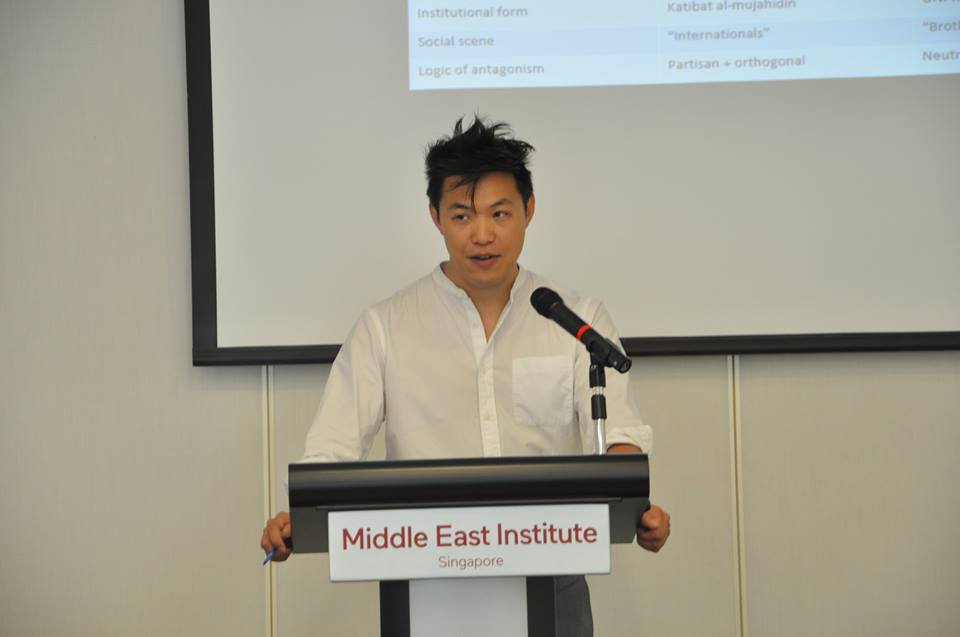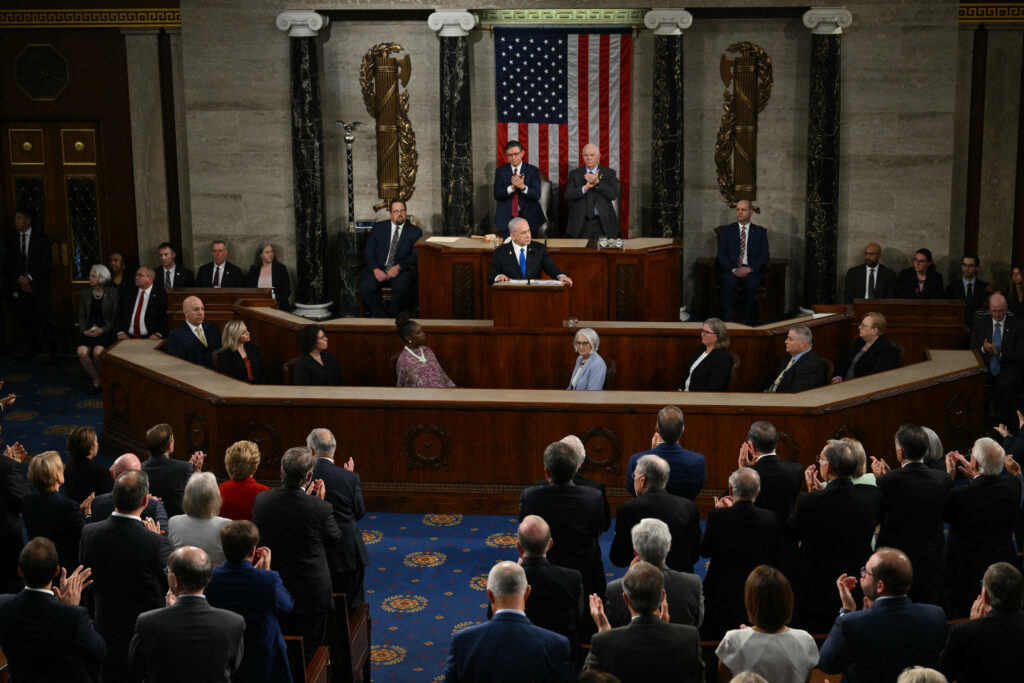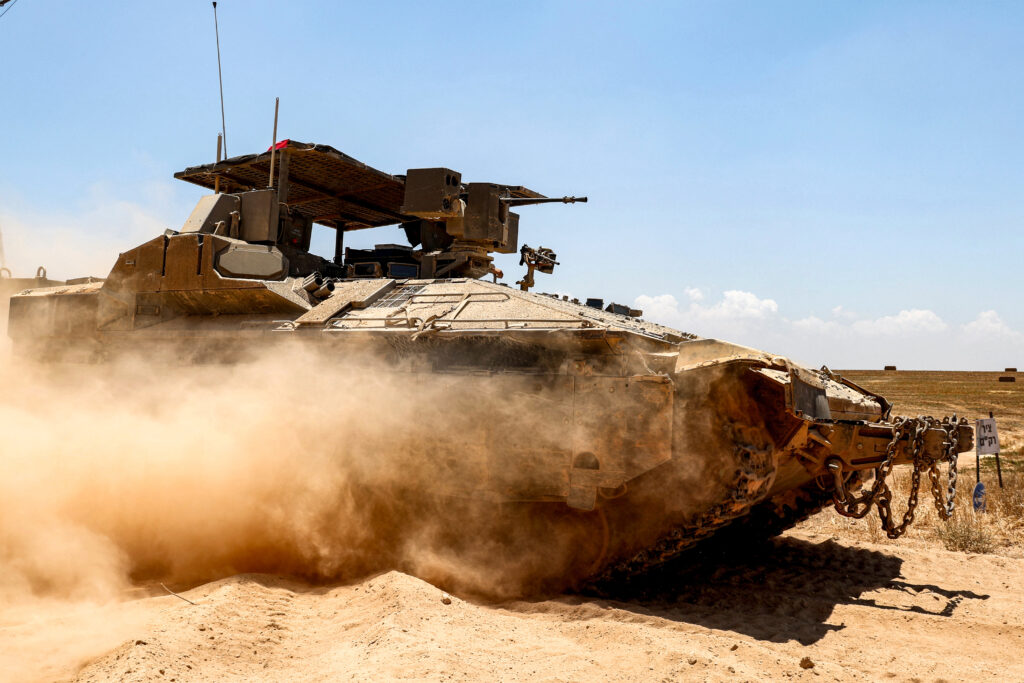Professor Darryl Li delivers his talk based on his research on transnational jihad and peacekeeping in Bosnia.
Black Beards and Blue Helmets: Jihad, Peace-keeping, and the Question of Universalism
- - July 25, 2018

On 18 July, Professor Darryl Li, Assistant Professor of Anthropology at the University of Chicago, delivered a talk at MEI based on a chapter from his upcoming book, The Universal Enemy: Jihad and Empire After the Cold War. His research in this chapter examined the Bosnian and transnational mujahedeen in Bosnia Herzegovina, 1992-95, through UN records and interviews conducted in various places. His book is perhaps the first extended ethnographic study of transnational jihad. Professor Li touched on the universalist aims of both the UN and the jihadists. He described both of them as interventions, only approaching the situation from different angles. He introduced this argument by describing a February 1995 report that came to Bosnian command, regarding a meeting that occurred in UN quarters with a Jordanian captain who was looking for his mujahideen brother. The captain had studied architecture in Italy, worked for a Kuwaiti NGO designing mosques, and then finally went to live in Jordan, while his brother was the member of a Salafi commune, a dedicated mujahideen fighter. They were two brothers and appeared to be very different, but according to Professor Li they shared more than just common blood – they were engaged in projects that were supposed to help all of humanity. Professor Li described the ummah and the international community as banners that were to be raised under different contexts.
Professor Li described the two idioms of the Bosnian context, starting with the jihad spoken of in the Salafi context of Bosnia, where the political ideology supplements violence to sovereignty. He mentioned that the jihadists are not necessarily condemning the state order, but offering a supplementary power. This is a group made up of foreigners and Bosnians alike, the result of imperial and routes of migration and diaspora. The second idiom is the international idiom of intervention. This is the “liberal” aspect. Professor Li described how liberalism was hegemonic after the Cold War, but still distinct from internationalism. After the fall of the Soviet Union, interventions were not strictly liberal, only in the name of international security. Liberalism was ascendant in projects of intervention, and liberalism and Salafism became dominant ideologies for interpreting their specific universalist projects. Professor Li mentioned that Salafism cannot exist without Islam, but liberalism can exist without internationalism.
The politics of peacekeeping in the global south were also discussed. Countries in the global south were always the first to be suspected of corruption, though they were the countries who absorbed much of the labor, work, and danger of interventions. Governments could contract their military forces to the UN for peacekeeping, to assume global capital and as an opportunity for army training – the rhetoric of peacekeeping was idealism, but the reality was crude materialism. Professor Li argued that historians of diasporic studies and empires can place the ideas of universalism into context, as is the case with Pakistan and India. Both nations have a quarter million soldiers engaged in peacekeeping efforts. This stemmed from the experience of service in the empire, with the history of the British Indian Army that had command units fighting from the 19th century, through WWII, until partition when the army relocated to Pakistan. During the intervention in Bosnia, everyone expected Pakistan to side with the Bosnian mujahideen, but Pakistani peacekeepers stressed their adherence to internationalism while expressing solidarity with Bosnian Muslims, and saw no conflict in these two sentiments. Pakistani Peacekeepers in Bosnia did not cross any lines of allegiance, but back in Pakistan, the Pakistani military spread a very different story about more violent, active tactics that the Pakistani peacekeepers were supposedly engaged in. This case, Professor Li argued, shows that Islamic solidarity and internationalism were compatible.
Professor Li also highlighted the relationship between the Bosnian mujahideen and the peacekeepers. In both contexts, cooperation and hostility were equally possible. For the mujahideen, the checkpoints of the Croats posed a great threat, and for the peacekeepers, the roads were an open space of danger, as they were less familiar with their surroundings than the mujahideen forces. Sometimes, interactions between the peacekeepers and mujahideen escalated to violence, especially against the British. The peacekeepers struggled to develop even rudimentary security intelligence on the mujahideen, but they knew them when they saw them, as there was a distinctly racialized perception of the mujahideen, from the perspective of western peacekeeping forces.
After the war, with Bosnia established as an independent state, the US possessed the moral authority on maintaining security in the country. The UN Security Council withdrew its forces to be replaced by the EU and NATO, with the troops basically just changing uniforms, switching from peacekeeping to state-building and governance. This was a different configuration of universalism, with the influence of American hegemony. The United States wanted to get rid of the mujahideen, and there was an order for the withdrawal of all foreign forces with the exemption of NATO and the UN – this was coding difference as “foreign”, but the internationals were explicitly exempt from this.
During the Q&A session, Professor Li was asked what interested him about this topic, and how he went about accessing the archives he used for his research. He responded that more generally, he had been trying to write an ethnographic view of movements of people in the global south. Questions of universalism kept coming up in his research, regarding a new world order, and Bosnia was a context where many post-Cold War ideas were being worked out. Regarding the archival research he conducted, Professor Li spoke of the UN archives, which have a 20-year declassification rule. He was probably one of the first people to access the UN archives from the time of the Bosnian war. He also utilized records of the UN war crimes tribunal, and followed leads he gained from his interviews.
A question also arose regarding the mujahideen who stayed in Bosnia after the war and what happened to them. Professor Li responded by describing how half the mujahideen who stayed were Bosnian and half were foreign. Of the Bosnians, some joined the Salafi movement, or dispersed. Of the foreigners, about one to two hundred stayed and got married, just generally continuing on with life. About a hundred Bosnian and foreign mujahideen moved with their families after the war and started a Salafi commune. Professor Li stated that the mujahideen presence is now very individualized, especially after the War on Terror when the Bosnian government tried to root out many of these people.
Darryl Li is an Assistant Professor of Anthropology at the University of Chicago and is writing a book under contract with Stanford University Press called The Universal Enemy: Jihad and Empire After the Cold War. His research has been published in Law & Social Inquiry, UCLA Law Review, Columbia Human Rights Law Review, Arab Studies Journal, and Middle East Report, and has been supported by the Wenner-Gren Foundation and the Social Science Research Council (USA). He holds a PhD in Anthropology & Middle Eastern Studies from Harvard University and a JD from Yale Law School and is a member of the New York and Illinois bars.
More in This Series
More in This Series
- Jean-Loup Samaan
- - July 11, 2024
- Aisha Al-Sarihi, Ehsan Rasoulinezhad, Jinseok Sung
- - June 20, 2024








